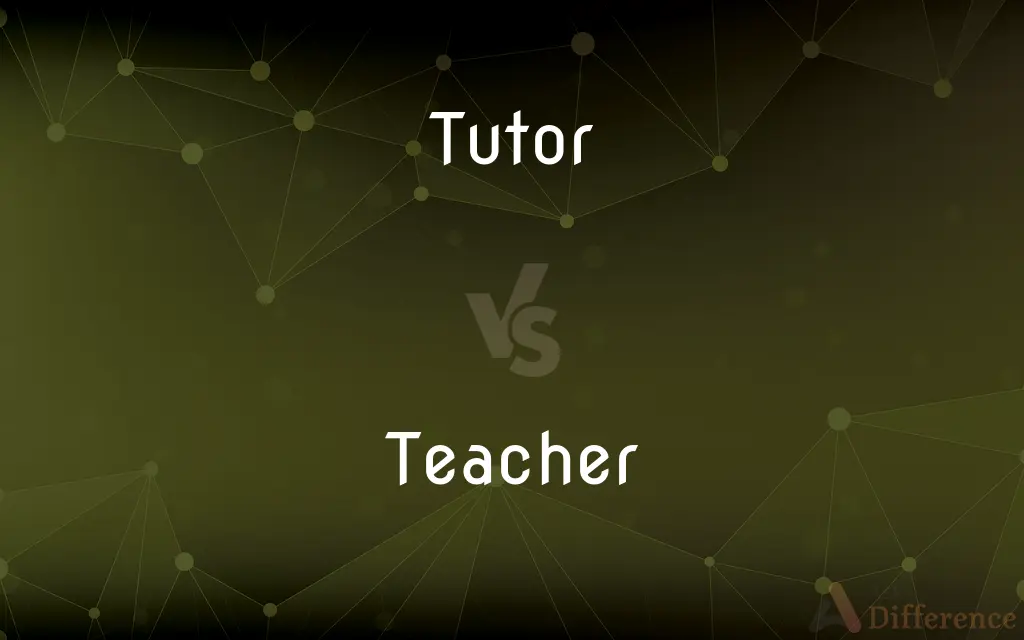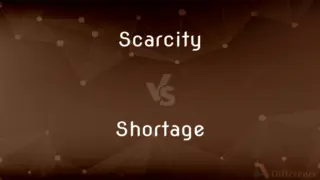Tutor vs. Teacher — What's the Difference?
By Tayyaba Rehman — Updated on November 3, 2023
A tutor typically provides personalized instruction to individuals or small groups, while a teacher leads a classroom and follows a set curriculum.

Difference Between Tutor and Teacher
Table of Contents
ADVERTISEMENT
Key Differences
A tutor often works with students on a one-to-one basis or in small groups, offering personalized assistance and focusing on specific challenges a student may be facing. In contrast, a teacher usually stands at the helm of a classroom, providing instruction to larger groups of students, often following a structured curriculum designed to impart a broad range of knowledge across a subject area. Tutors may tailor their approach to the individual learning styles and paces of their students, while teachers must create lesson plans that can be applied to all students and often must adhere to educational standards and testing requirements.
Tutors are frequently employed to supplement the educational experience a teacher provides, offering additional help in understanding complex topics or preparing for exams. Teachers, on the other hand, are the primary source of education, equipped with credentials to guide students through an academic program. While a tutor might hone in on a student's weaknesses, a teacher is responsible for covering a comprehensive syllabus, aiming to meet the educational needs of the entire classroom.
Tutors may not always need formal teaching qualifications, depending on the context of their work. They can be peers, undergraduates, or experts in a particular field who provide help outside the traditional classroom setting. Teachers, however, are usually required to have formal teaching credentials and state certifications to lead a classroom, reflecting a broader pedagogical responsibility to their students.
In terms of setting, tutors can be found in a variety of environments, from homes to tutoring centers, and their sessions can be ad-hoc, arranged as needed. Teachers typically work in schools or educational institutions with set class times and often contribute to developing a school's curriculum and educational strategies.
Lastly, tutors are often seen as facilitators to help a student improve their understanding and performance in a subject. In contrast, teachers are perceived as authority figures in the educational system, with a role that encompasses not just teaching academic subjects but also instilling discipline, social values, and critical thinking skills in their students.
ADVERTISEMENT
Comparison Chart
Setting
Individual or small groups
Classrooms
Educational Qualifications
May not be required
Formal teaching qualifications required
Primary Goal
Address specific educational needs
Provide comprehensive education
Student-Teacher Ratio
Low, often one-to-one
High, one-to-many
Curriculum
Flexible and personalized
Structured and standardized
Compare with Definitions
Tutor
A tutor can be a private teacher, especially one who teaches a single student or a very small group.
His parents hired a tutor to prepare him for the entrance exam.
Teacher
In the context of a subject matter, a teacher is one who imparts knowledge or skill.
Her piano teacher was very strict but incredibly talented.
Tutor
A tutor can refer to a person who provides online instructional support.
She found an excellent tutor to help her with Spanish through an online platform.
Teacher
A teacher can be someone who provides guidance and wisdom beyond academics, such as a mentor.
Her science teacher also taught her the importance of perseverance.
Tutor
A tutor is a person who gives individual, or small group, instruction.
The tutor helped her improve her math skills dramatically.
Teacher
A teacher is a person who instructs students in a school.
The teacher assigned a challenging set of problems for homework.
Tutor
A private instructor.
Teacher
A teacher is professionally trained to educate and manage a classroom environment.
After five years of training, he became a certified history teacher.
Tutor
One that gives additional, special, or remedial instruction.
Teacher
A teacher in a spiritual context refers to someone who imparts moral or religious lessons.
The teacher at the Sunday school was loved by all her students.
Tutor
A teacher or teaching assistant in some universities and colleges having a rank lower than that of an instructor.
Teacher
A teacher (also called a schoolteacher or formally, an educator) is a person who helps students to acquire knowledge, competence or virtue. Informally the role of teacher may be taken on by anyone (e.g.
Tutor
A graduate, usually a fellow, responsible for the supervision of an undergraduate at some British universities.
Teacher
One who teaches, especially one hired to teach.
Tutor
(Law) The guardian of a minor.
Teacher
A person who teaches, especially one employed in a school.
Tutor
To act as a tutor to; instruct or teach privately.
Teacher
The index finger; the forefinger.
Tutor
To have the guardianship, tutelage, or care of.
Teacher
An indication; a lesson.
Tutor
To function as a tutor.
Teacher
(Mormonism) The second highest office in the Aaronic priesthood, held by priesthood holders of at least the age of 14.
Tutor
To be instructed by a tutor; study under a tutor.
Teacher
One who teaches or instructs; one whose business or occupation is to instruct others; an instructor; a tutor.
Tutor
One who teaches another (usually called a student, learner, or tutee) in a one-on-one or small-group interaction.
He passed the difficult class with help from his tutor.
Teacher
One who instructs others in religion; a preacher; a minister of the gospel; sometimes, one who preaches without regular ordination.
The teachers in all the churches assembled.
Tutor
(UK) A university officer responsible for students in a particular hall.
Teacher
A person whose occupation is teaching
Tutor
One who has the charge of a child or pupil and his estate; a guardian.
Teacher
A personified abstraction that teaches;
Books were his teachers
Experience is a demanding teacher
Tutor
(trading card games) A card that allows one to search one's deck for one or more other cards.
Tutor
(transitive) To instruct or teach, especially an individual or small group.
To help pay her tuition, the college student began to tutor high school students in calculus and physics.
Tutor
To treat with authority or sternness.
Tutor
(trading card games) To fetch a card from one's deck.
Tutor
One who guards, protects, watches over, or has the care of, some person or thing.
Tutor
A treasurer; a keeper.
Tutor
One who has the charge of a child or pupil and his estate; a guardian.
Tutor
A private or public teacher.
Tutor
An officer or member of some hall, who instructs students, and is responsible for their discipline.
Tutor
An instructor of a lower rank than a professor.
Tutor
To have the guardianship or care of; to teach; to instruct.
Their sons are well tutored by you.
Tutor
To play the tutor toward; to treat with authority or severity.
Tutor
A person who gives private instruction (as in singing or acting)
Tutor
Be a tutor to someone; give individual instruction;
She tutored me in Spanish
Tutor
Act as a guardian to someone
Tutor
In a collegiate setting, a tutor may be an advanced student or graduate assisting others in their studies.
The chemistry tutor at the college helped students understand organic reactions.
Tutor
A tutor may also be a teacher of a rank below instructor at some American universities.
The tutor at the university was known for his engaging lectures on medieval history.
Common Curiosities
Are tutors usually employed by schools?
Tutors can be independent, work for tutoring companies, or be employed by schools.
Can teachers also work as tutors?
Yes, many teachers offer tutoring services outside of school hours.
Is the role of a tutor the same in all countries?
No, the role and perception of tutors can vary internationally.
Can tutoring be done online?
Yes, online tutoring is a growing field that provides flexible learning opportunities.
Do tutors need a certification?
Tutors do not always need certification; their qualifications can vary depending on the subject and level they teach.
Do teachers have to follow a curriculum?
Yes, teachers usually follow a curriculum that aligns with educational standards.
Do tutors create their own curriculum?
Tutors often create or adapt materials to meet individual student needs rather than following a set curriculum.
How does the impact of a tutor differ from that of a teacher?
Tutors often have a direct impact on an individual's specific learning needs, while teachers impact a broader student population.
Are teachers or tutors more flexible in scheduling?
Tutors typically offer more flexible scheduling to accommodate individual needs.
Can anyone become a tutor?
While many can become tutors, effective tutors usually have expertise in their subject area and some teaching ability.
What is the main difference in teaching approach between a tutor and a teacher?
Tutors often provide personalized instruction, while teachers must address the needs of an entire class.
Can a teacher's role include duties beyond instruction?
Yes, teachers often have additional duties like grading, counseling, and managing classroom dynamics.
Does the environment affect the tutor's and teacher's methods?
Yes, the environment can shape how both tutors and teachers approach instruction, with tutors often adapting to various settings and teachers typically working within the school structure.
Do teachers only work in formal school settings?
While most teachers work in schools, some may teach in alternative settings like prisons, hospitals, or in outdoor education.
Is it common for a tutor to teach more than one subject?
Some tutors specialize in one subject, while others may offer help in multiple areas, depending on their expertise.
Share Your Discovery

Previous Comparison
Gull vs. Rook
Next Comparison
Scarcity vs. ShortageAuthor Spotlight
Written by
Tayyaba RehmanTayyaba Rehman is a distinguished writer, currently serving as a primary contributor to askdifference.com. As a researcher in semantics and etymology, Tayyaba's passion for the complexity of languages and their distinctions has found a perfect home on the platform. Tayyaba delves into the intricacies of language, distinguishing between commonly confused words and phrases, thereby providing clarity for readers worldwide.















































